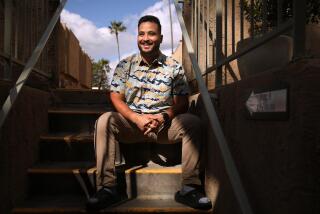Mystery Lingers After Bingo Suicide
LAS VEGAS — Investigators wanted to interview Brett Keeton, to figure out how he was able to rig his company’s electronic score-keeping devices to give him an unfair edge in bingo parlors.
They had never seen it before, this way of cheating at bingo. It was intriguing, cloaked in the arcane language of computer code. And Keeton was something of a genius, one of the few employees at the company who could have pulled it off.
Investigators also would have liked to ask him why. It didn’t appear he was motivated to get rich quick. You don’t do that playing bingo, winning a few hundred dollars here and there. More likely, it was the thrill of the deceit.
All his wife would like, for now, is to read his last words, the note he left in his car. They might bring some consolation as she is left to raise the couple’s two young boys.
For investigators, and for Hilary Keeton, there are no immediate answers.
Just hours after learning that he was under investigation--that detectives for the Nevada Gaming Control Board had shown up at his Reno office Sept. 20--Keeton, 38, a University of Oklahoma computer science graduate of superb intelligence, parked his car next to a tollbooth on the Golden Gate Bridge, walked toward the middle span, climbed over a guardrail and, facing the lights of San Francisco, jumped to his death.
A Coast Guard boat gunned to about 40 knots racing toward the bridge, chasing a flare tossed by a bridge worker to help locate where he had landed. Within minutes, his body was found in the reflections of the floodlit water, and a paramedic pronounced him dead.
Just 24 hours earlier, Keeton had been playing bingo in a suburban Las Vegas casino. Something about his behavior--investigators won’t say what it was--concerned casino officials. State agents were called that night, and they reviewed a surveillance tape from an overhead camera. In the highly regulated world of the Nevada gambling industry, the player was recognized as Keeton, a senior software engineer for GameTech International Inc., a Reno-based bingo accessories manufacturer.
While there are many variations, the basic bingo game involves numbered balls being selected randomly, and players marking their cards if one of the 25 squares has the same number. Five marked squares in a row--vertically, diagonally or horizontally--constitutes a winner.
Because the play cards are printed with different combinations of numbers, a player’s chances of winning increase with the more cards played.
Bingo players traditionally use fat felt pens, called daubers, to mark the cards.
Veteran bingo players may play 20, 30 or even more bingo cards per game, quickly scanning each one to mark any successful “hits” before the next number is announced.
GameTech manufactures electronic tallying devices that allow a player to track as many as 64 electronic bingo cards at a time. Using a hand-held device, the player punches in the number called, and the device instantly searches and marks any winning hits among the cards. Casinos charge players about $1 to use the devices.
In a fancier desktop model that’s wired to a central bingo console, the winning numbers automatically are fed into the device and recorded. Some players like these devices because they come with small, built-in television screens for simultaneous entertainment.
On Sept. 19, Keeton was playing on the desktop devices and apparently was winning disproportionately often compared with other players. Perplexed casino officials called state investigators, who are accustomed to dealing with cheaters trying to manipulate slot machines by using slugs, strings, wires and light beams to confuse the machine’s internal hardware. But discovering a cheater using proprietary software programming knowledge is rare.
The Gaming Control Board wasted no time in identifying Keeton, and investigators went to his office the next morning--but Keeton didn’t show up. Based on the concerns expressed by the gaming agents, the company immediately fired him.
Word reached Keeton and his wife, and that afternoon they hired an attorney. The lawyer never had a chance to meet his client.
Dennis Neilander, chairman of the Gaming Control Board, said investigators are in the midst of their probe and won’t discuss details.
But this much is believed, he said: Keeton had somehow manipulated several machines to play many more bingo cards than the maximum allowed for any single bingo session. He had no control over the bingo balls, no way of generating specific numbers. But with far more cards than others, Keeton’s chances of winning were improved.
It is not known how long Keeton had been playing this way, or how much money he collected. He apparently ignored jackpots that paid more than $1,200, because he would have had to complete Internal Revenue Service paperwork.
It isn’t known whether Keeton compromised the machines with corrupt software while they were being manufactured, or simply knew how to capitalize on a vulnerability after they were installed at a casino.
By reverse engineering--taking the machines apart and examining the computer codes--investigators hope to unravel his trick. “We’re making progress,” Neilander said Friday. “But we’re still not sure how he did this.” Until the mystery is solved, all of the nearly 300 desktop devices used in Nevada have been shut down by gaming officials, but the hand-held devices remain in operation. The company also voluntarily shut down its desktop machines in Texas and Mississippi, pending the results of the investigation.
The other mystery, Neilander said, is Keeton’s motive. “My experience in situations like this is, it’s the thrill of trying to defeat the system. But in this case, we don’t know.”
Company officials likewise were wondering. “By all accounts, he had been an exemplary employee, and we can only speculate regarding what caused him to do this,” GameTech Chief Executive Clarence H. Thiesen said.
Reno attorney David Houston said Hilary Keeton has been given no evidence to support the allegations against her husband, and she is concerned that his reputation is being wrongfully tarnished.
“He was a good father, a wonderful husband and an exemplary employee,” Houston said. Nothing of the family’s lifestyle, he said, indicated that they were living beyond the means of Keeton’s salary of about $80,000 a year.
Keeton may have committed suicide, Houston said, not out of guilt but because he was “so adversely impacted with the specter of an investigation. We haven’t yet been able to see the suicide note, so we’re all at a loss.”
GameTech executives declined to offer access to Keeton’s co-workers. And his neighbors knew little of the man.
“They were private people who stayed to themselves,” said Jena Iverson, who for the last year has lived a few houses from the Keetons.
The Keetons moved to Reno in October from the Denver suburb of Thornton. Former neighbor Paula Burton said she and her husband moved into their Thornton home within a day of the Keetons, about seven years ago, and that Brett Keeton made an immediate impression.
“My husband and he were putting up the new mailboxes, side by side, and my husband introduced himself, and Brett never said a word,” Burton said. “In the six years we lived next to each other--and we don’t even have a fence separating the backyards--I don’t think Brett Keeton said two words to us.”
Keeton was silent to the end. California Highway Patrol officer Julio Bandoni had bridge duty that Friday night and was dispatched after a motorist reported seeing a man climbing over a rail and onto the outer side of the bridge.
The moment Bandoni’s flashlight illuminated Keeton, he jumped. “He didn’t give us a chance to even talk to him,” the officer said. “I can only speculate that he had been waiting until he knew he had been seen so his body could be recovered. As soon as my light hit him, he jumped and screamed.”
More to Read
Inside the business of entertainment
The Wide Shot brings you news, analysis and insights on everything from streaming wars to production — and what it all means for the future.
You may occasionally receive promotional content from the Los Angeles Times.










